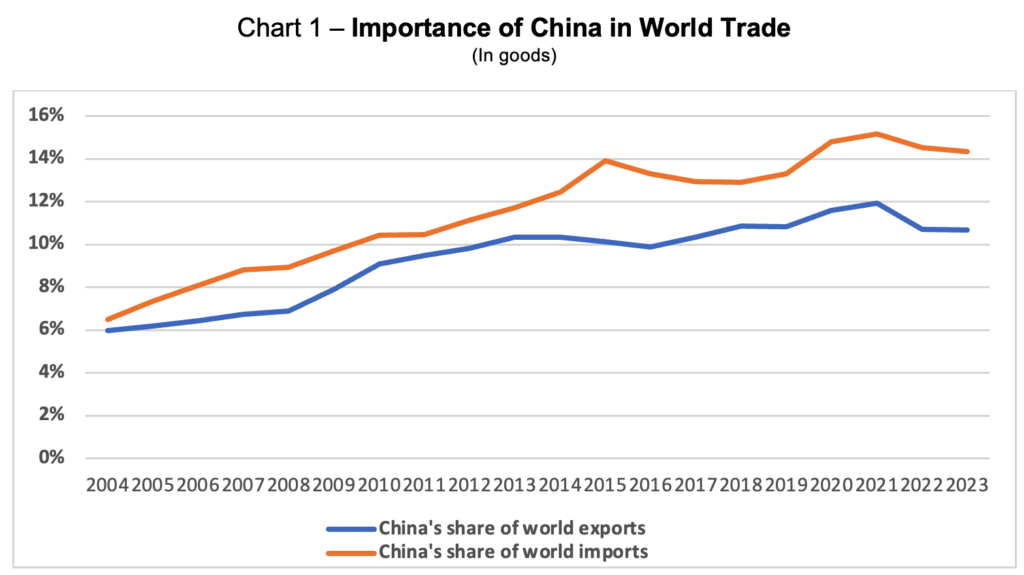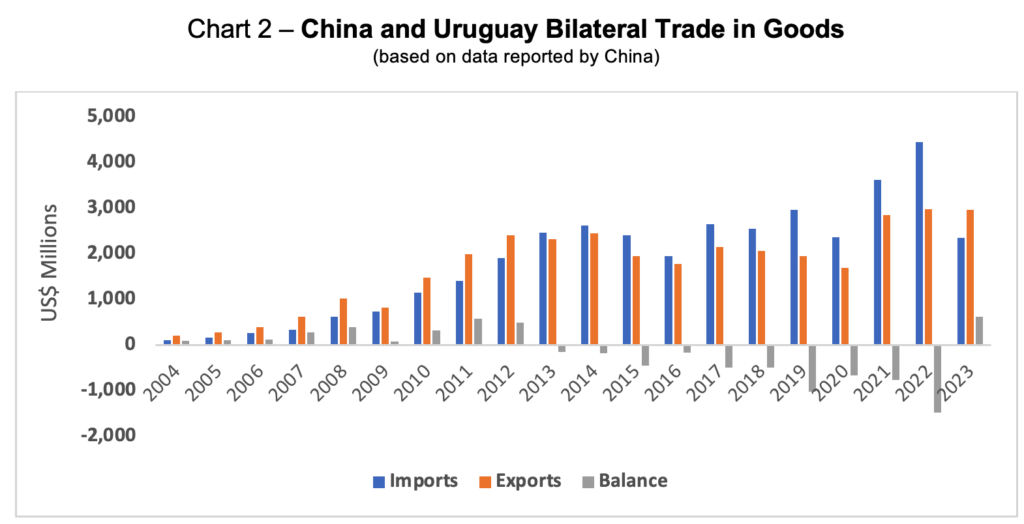China in Latin America: The Building of Uruguay’s Partnership
Scroll Down to Read
By Nicolas Potrie

In recent decades, China has become the main exporter in goods, accounting for no less than 14% of global exports in 2023 (without considering Hong Kong) and 10% of imports according to data from Trade Map.
Currently, the Asian economy is among the main trading partners of more than 150 countries, and its openness index has increased 11.89% since 2008, according to what was reported by the Chinese Ministry of Foreign Affairs.
 Source: Potrie, based on Trade Map
Source: Potrie, based on Trade Map
China’s economic and commercial relations have expanded in recent decades on all continents, but in recent years, it has faced difficulties in the U.S. and EU because of the trade war. This context has favored the expansion of China’s exchanges with other developing regions, which has occurred in Southeast Asia (ASEAN), Africa, Central Asia, and Latin America and the Caribbean.
In the case of Uruguay, for more than two decades, China has become the country’s first or second trading partner, competing for that ranking with Brazil.
The relationship between Uruguay and China began to change very rapidly since the reestablishment of diplomatic relations in 1988, an episode in which the Uruguay – People’s Republic of China Chamber of Commerce (UCHCC) played a fundamental role, even with the audacity to be found before that date. Regarding the aforementioned role, it should be noted that the businesspeople led the rapprochement with China, anticipating that it would be a central player in the world economy and trade, especially in agriculture and food, which not only benefited Uruguay but also the rest of the Mercosur countries.
The important evolution of bilateral trade between the two countries and the maturity achieved in the relationship confirm that the businesspeople who founded UCHCC in 1986 were not wrong with their projections.
According to Trade Map data reported by China Customs, in 2023 the Asian power imported US$ 2,348 million in goods from Uruguay (that amount in 2004 was US$110 in current dollars), while in that same year it exported US$ 2,972 (in 2004 the amount placed in Uruguay was US$ 99 million). Chinese imports from Uruguay grew at an annualized rate of 17.5% between 2004 and 2023, while Chinese sales to the South American country grew at 15.0% in the same period.
 Source: Potrie, based on Trade Map
Source: Potrie, based on Trade Map
Trade with China faces additional challenges associated with the change in development model that the world power is going through, but also new opportunities due to the value that the Chinese government is giving to its trading partners (especially in its diplomatic logic of South-South Cooperation) in an international context marked by the trade war (not only with the U.S. and the EU, but also with other markets that will be forced by Trump to apply an increase in tariffs against China, as the case of Mexico for example).
It is in this new scenario where China has deployed important diplomatic action, promoting institutionalized dialogues through trade agreements (FTA), global initiatives such as The Belt and The Road, the expansion of the BRICS or the launch of investment banks such as the new Development Bank and the Asian Infrastructure Investment Bank. It also promotes actions with Latin American countries within the framework of the International Bamboo and Rattan Organization.
Additionally, at the political level, with Latin America and the Caribbean, China has formal dialogues with the main integration processes in addition to the links in the CELAC Group – China. For China, institutional cooperation spaces are relevant and are used to expand relations with its partners.
Institutional Cooperation with China
Cooperation with China in the agricultural inputs sector has been very present since the 1980s, not only because of the link between said sector and Uruguayan agricultural and food exports to China, but also because of the supply of agricultural inputs from China to Uruguay with competitive prices and technological level. In a few decades, China has become the main world player in the sector, with enough installed capacity and knowledge to meet global demand.
Within this framework, accompanying China’s development in this and other industrial sectors, the China Crop Protection Industry Association (CCPIA) has made agreements with various associations in Latin America and the Caribbean linked to crop control.
In the case of Uruguay, the first agreement was signed in May 2024 with an official visit by the CCPIA, which, in addition to official visits at the national government level, held meetings with the UCHCC and the National Chamber of Fertilizers and Phytosanitary Products (CANAFFI), where a series of agreements were signed related to the certification of origin and the traceability and safety of the products.
It should be remembered that CCPIA is a Chinese association dependent on the Ministry of Agriculture that acts as a company certification entity (its membership list amounts to more than eight hundred private companies), which provides security to the operations of all parties and is a bridge for enhance business opportunities.
Among its main activities, three stand out:
- Research and encouraging companies to have the support to advance in innovation and development;
- Support to transform the productive matrix, where more technology is demanded in production processes, which implies greater investments in machinery and equipment and has a positive impact on improving productivity levels, and;
- Security in agricultural inputs produced, a highly demanded aspect in current global trade operations.
In that sense, it must be recognized that China currently applies strict regulations on environmental matters, which not only occurs in this sector and has become a national policy that seeks to comply with multilateral commitments.
Agreements such as those mentioned, allow companies in the industry to confirm compliance with Latin American standards, in addition to giving confidence to the relationship between industry associations. The agreements are also an instrument used to enhance the relationship in other areas, beyond the strictly regulated one, and represent for China another step towards the long path of trust.
An example of the usefulness of this type of agreement is the invitation made by the CCPIA in return for the attention received in its mission in Latin America. Delegations from Argentina, Brazil and Uruguay were invited to the AgroChemEx (ACE), a fair held in the city of Shanghai from 15 -18 October 2024. This opportunity came up as a result of CCPIA’s institutional cooperation plan after the visit to the region, a chance to expand the business opportunities for the partners of the organizations involved.
Future Considerations
Many of the efforts in institutional cooperation with China must be carried out by governments or regional organizations, such as the case of Uruguay, a country that has entered The Belt and The Road, the New Development Bank, the Asian Infrastructure Investment Bank and more recently to the International Rattan and Bamboo Organization. Furthermore, Uruguay promotes an FTA with China, and it was during its pro tempore presidency of Mercosur that the VII Mercosur – China Dialogue was held in Montevideo.
Beyond these efforts at the public level, always relevant for China, the private sector, through its business chambers and sector associations, must be active in identifying opportunities to enhance the network of agreements and signing agreements with Chinese institutions.
This path is no longer optional, but rather acquires crucial importance in maintaining ties of trust with China, but at the same time will collaborate with a greater understanding of the important economic and social transformations that are being conducted in China.
On the other hand, in an international context that is unfriendly within the framework of the trade war and geopolitical tensions, for China, institutional cooperation is an action that fosters trust and therefore, the increasingly demanded security in the supply chains.
Nicolas Potrie is the Director of Tafirel, an agro inputs company based in Uruguay. Potrie is also the President of the Uruguay – People’s Republic of China Chamber of Commerce and Director of the National Association of Phytosanitary and Fertilizers of Uruguay.